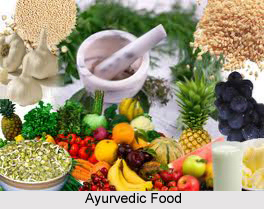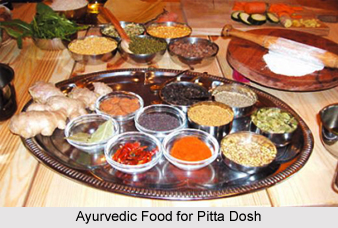 Ayurveda treats diet as not only food, but also the source of taste, smell and satisfaction .Eating, Ayurveda believes, leads to bliss. Prakriti is the aggregate of shape, size, complexion, weight, energy levels, emotional reactions and health system . Type of diet and food-habits definitely decides the pattern of the Prakriti or the distinct essential constitution in every man.
Ayurveda treats diet as not only food, but also the source of taste, smell and satisfaction .Eating, Ayurveda believes, leads to bliss. Prakriti is the aggregate of shape, size, complexion, weight, energy levels, emotional reactions and health system . Type of diet and food-habits definitely decides the pattern of the Prakriti or the distinct essential constitution in every man.
Ayurveda states that tastes certainly affect the digestive and metabolic processes (Vipaka) of an individual. Digestion of heavy tastes needs more energy generation . While lighter tastes can be easily assimilated. There are six kinds of tastes available in Ayurvedic arena :
Amla Rasa or sour adds taste to food. It increases appetite. It remarkably lessens anorexia or lack of appetite.It gives relief by releasing gas from the system.It serves as an anti-coagulant also.However excess of sour taste can aggravate thirst and cause a burning sensation in the throat region. Too much of sour food invites diseases like anemia, hemorhage, vertigo and myopic vision. Nevertheless, sour taste endows one with the mental-power of good intellect and sharp wit.
 Madhura Taste or Sweet Taste is the mass` favourite. .It nourishes through satisfaction. Consumption of sweets result in weight-accumulation, feeling of coldness and energetic exburance.It facilitates purgation(bowel-clearance), neurological relaxation and diuretic therapy.Still,if lumps of sugar-based food are taken, obesity, diabetes, emotional immaturity,laziness etc. can bother a sugaraholic.
Madhura Taste or Sweet Taste is the mass` favourite. .It nourishes through satisfaction. Consumption of sweets result in weight-accumulation, feeling of coldness and energetic exburance.It facilitates purgation(bowel-clearance), neurological relaxation and diuretic therapy.Still,if lumps of sugar-based food are taken, obesity, diabetes, emotional immaturity,laziness etc. can bother a sugaraholic.
Tikta or Bitter Rasa reduces anorexia .It effectively elevates the digestive speed. Thus bitter dishes precedes the intake of meal in many regions of India .It flushes out the toxins or "ama" from the body. Tikta cures itchy,eruptive skin problems.But bitterness in diet should be in proportion. Else it might lead to weight-loss ,dry skin or headaches.
Kashaaya Rasa or Astringent taste acts as a perfect cooling agent. It stops the secretion of sweat and tears. The light taste induces fantastic sleep. It assists in granulation and absorption. But the awkward feeling of tastelessness and stiffness are its drawbacks . It subdues anxiety and stress . However one should carefully avoid excessively astringent diet.It will trouble one with constipation and internal dryness.
Lavaana or Salt Taste renders food as tasty. It stimulates the flow of saliva and gastric juices. Abundant salt -usage negatively precipitates premature aging, hair loss, heaviness, gastric disorders. Ayurveda considers it responsible for nurturing deep uncontrollable desires.
Katu Rasa or Pungent Rasa is associated with hot,spicy food . The burning sensation of pungent tastes makes one thirsty.It activates the bodily fluids like saliva, sweat, tears, mucus and blood.This inevitably accelarates digestion.Congested tissue fibres are distangled. Plenty of spice leaves one with swollen lips, burning skin, and frantic thirst.
Ayurvedic dietary prescription calls for a proper proportion of every taste in food-preparations for getting a healthy diet.





